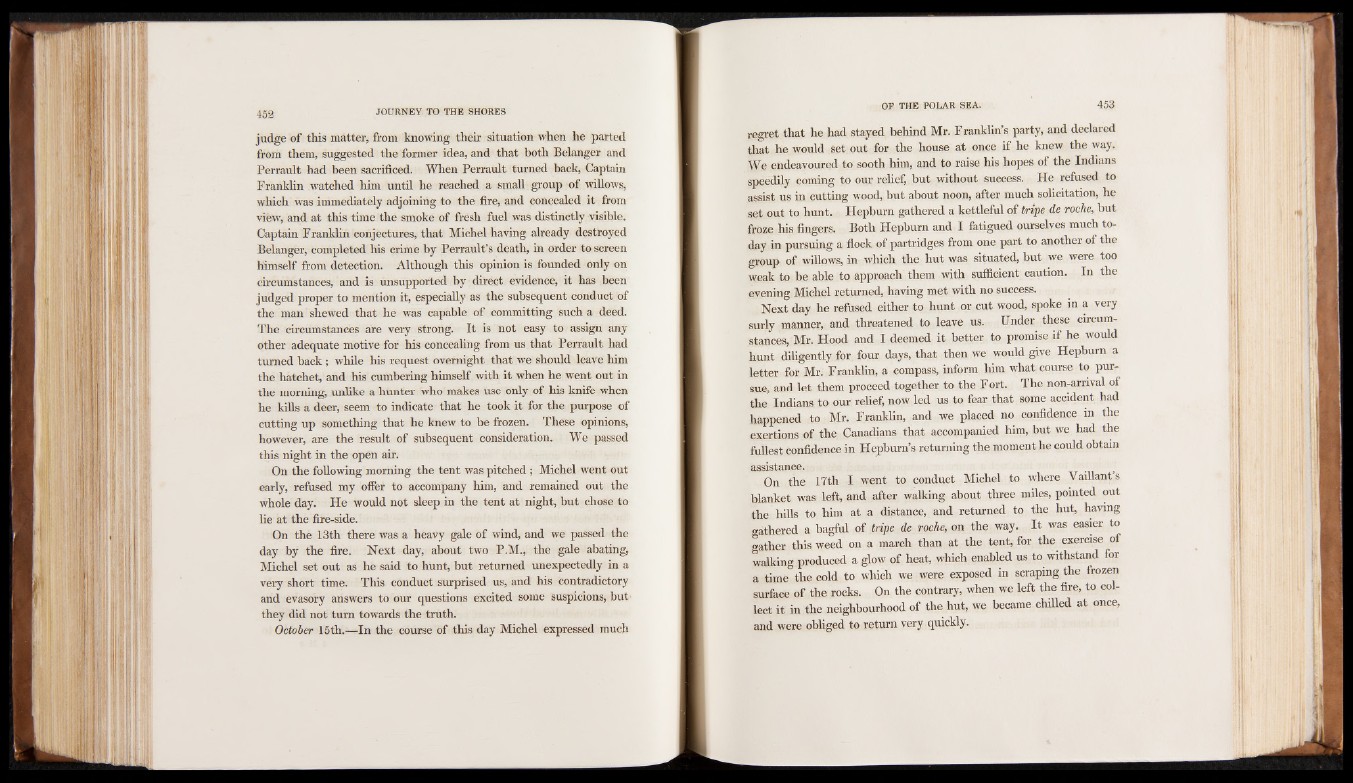
judge of this matter, from knowing their situation when he parted
from them, suggested the former idea, and that both Belanger and
Perrault had been sacrificed. When Perrault turned back, Captain
Franklin watched him until he reached a small group of willows,
which was immediately adjoining to the fire, and concealed it from
view, and at this time the smoke of fresh fuel was distinctly visible.
Captain Franklin conjectures, that Michel having already destroyed
Belanger, completed his crime by Perrault’s death, in order to screen
himself from detection. Although this opinion is founded only on
circumstances, and is unsupported by direct evidence, it has been
judged proper to mention it, especially as the subsequent conduct of
the man shewed that he was capable of committing such a deed.
The circumstances are very strong. It is not easy to assign any
other adequate motive for his concealing from us that Perrault had
turned back ; while his request overnight that we should leave him
the hatchet, and his cumbering himself with it when he went out in
the morning, unlike a hunter who makes use only of his knife when
he kills a deer, seem to indicate that he took it for the purpose of
cutting up something that he knew to be frozen. These opinions,
however, are the result of subsequent consideration. We passed
this night in the open air.
On the following morning the tent was pitched ; Michel went out
early, refused my offer to accompany him, and remained out the
whole day. He would not sleep in the tent at night, but chose to
lie at the fire-side.
On the 13th there was a heavy gale of wind, and we passed the
day by the fire. Next day, about two P.M., the gale abating,
Michel set out as he said to hunt, but returned unexpectedly in a
very short time. This conduct surprised us, and his contradictory
and evasory answers to our questions excited some suspicions, but'
they did not turn towards the truth.
October 15 th.—In the course of this day Michel expressed much
regret that he had stayed behind Mr. Franklin's party, and declared
that he would set out for the house at once if he knew the way.
We endeavoured to sooth him, and to raise his hopes of the Indians
speedily coming to our relief, but without success. He refused to
assist us in cutting wood, but about noon, after much solicitation, he
set out to hunt. Hepburn gathered a kettleful of fripe de roche, but
froze his fingers. Both Hepburn and I fatigued ourselves much today
in pursuing a flock of partridges from one part to another of the
group of willows, in which the hut was situated, but we were too
weak to be able to approach them with sufficient caution. In the
evening Michel returned, having met with no success.
Next day he refused either to hunt or cut wood, spoke in a very
surly manner, and threatened to leave us. Under these circumstances,
Mr. Hood and I deemed it better to promise if he would
hunt diligently for four days, that then we would give Hepburn a
letter for Mr. Franklin, a compass, inform him what course to pursue,
and let them proceed together to the Fort. The non-arrival of
the Indians to our relief, now led us to fear that some accident had
happened to Mr. Franklin, and we placed no confidence in the
exertions of the Canadians that accompanied him, but we had the
fullest confidence in Hepburn’s returning the moment he could obtain
assOisnta ntchee. 17th I went to conduct Michel to where Vai-liil ant7 s
blanket was left, and after walking about three miles, pointed out
the hills to him at a distance, and returned to the hut, having
gathered a bagful of tripe de roche, on the way. It was easier to
gather this weed on a march than at the tent, for the exercise of
walking produced a glow of heat, which enabled us to withstand for
a time the cold to which we were exposed in scraping the frozen
surface of the rocks. On the contrary, when we left the fire, to collect
it in the neighbourhood of the hut, we became chilled at once,
and were obliged to return very quickly.